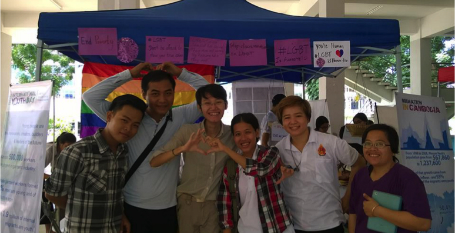Micro Rainbow International, a non-profit organisation which aims to lift LGBT people out of poverty, has set up a crowdsourcing platform to help individuals boost their income and economic opportunities.
It aims to help people like Phally in Phnom Penh. Phally survives on a meagre income from selling fried papaya on the streets of the city. The 27-year-old gay man would like to expand his small business to sell chicken wings and desserts. But it has been impossible to get a loan.
In 2014 the non-profit met with several LGBT NGOs in the country and found that discrimination against LGBTs negatively affected their chances in many ways. These included: Rejection by their families and communities forces many to leave home and give up school, abusive police often arrest gays and transwomen, forced marriages of lesbians and transgender men, little access to health services including sexual and reproductive health, few job opportunities leave many to resort to sex work and drug dealing, isolation and lack social safety nets and the fact that LGBT students and teachers are regularly removed from schools.
To what extend sexuality directly affects poverty is unknown and as poverty eradication is one of the new global development goals agreed by world leaders last month activists are worried that there is no specific mention of sexual minorities.
"Poverty among LGBTI people doesn't get a lot of attention," Sebastian Rocca, chief executive of Micro Rainbow told the Thomson Reuters Foundation.
"There is little data yet but it is clear from our work that in an environment where poverty and prejudice are widespread, like in Cambodia, many LGBTI people are finding it hard to make a living and face rejection and violence from their families."
Micro Rainbow provides support for LGBTI people to set up small businesses, and also works with companies to break down discrimination and offer training opportunities.
Micro Rainbow also seeks to counteract a “gay affluence myth” which may be why poverty among LGBT fails to get attention. The organisation is working in Cambodia, Brazil and Britain and has plans to expand to Uganda, Zimbabwe and the Philippines.

